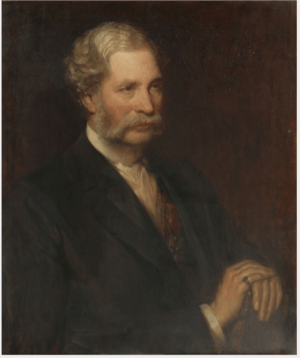William John Fitzpatrick facts for kids
Quick facts for kids
William John Fitzpatrick
|
|
|---|---|
 |
|
| Born | 31 August 1830 |
| Died | 24 December 1895 |
| Occupation | Writer |
William John Fitzpatrick (born August 31, 1830 – died December 24, 1895) was an Irish historian. He spent his life researching and writing about important people and events in Irish history.
Contents
A Look at His Life
Early Life and Education
William John Fitzpatrick was born in Dublin, Ireland, on Thomas Street. His father, John Fitzpatrick, was a successful merchant. This meant William grew up with a good financial background.
He went to school at a Protestant school first. Later, he attended Clongowes Wood College in County Kildare. This was a well-known school run by the Jesuit order. From a young age, William was very interested in finding out hidden or less-known facts about famous people.
Becoming a Historian and Writer
In 1855, William published his first book, The Life, Times, and Contemporaries of Lord Cloncurry. This book showed his early interest in history. His next book, The Life and Times of Bishop Doyle (1861), was much more successful. It gave a clear picture of an important person and added useful information to Irish history from the 1800s.
William was very determined in his research. For example, in 1855, he wrote letters to a publication called Notes and Queries. He tried to argue that Sir Walter Scott didn't write all of the famous Waverley Novels himself. He thought Scott's brother, Thomas Scott, deserved more credit. Even though his claims were not accepted, he continued to publish his ideas.
He also wrote about other important figures. In 1859, he published The Friends, Foes, and Adventures of Lady Morgan. This was followed by Lady Morgan, her Career, Literary and Personal in 1860. He also wrote Anecdotal Memoirs of Archbishop Whately in 1864.
Discovering Irish History
William John Fitzpatrick found his true calling when he started looking into the secret history of Ireland before it joined with Great Britain. This period is known as "before the Union."
His book, Lord Edward Fitzgerald, or Notes on the Cornwallis Papers (1859), was the first of these important works. He then continued this research with The Sham Squire in 1866. This book explored the story of Lord Edward FitzGerald's betrayal. It was very popular, selling over sixteen thousand copies!
In 1867, he published Ireland before the Union, continuing his research into this period. This book included interesting parts from the private diary of John Scott, 1st Earl of Clonmell.
Later Works and Recognition
After 1867, William continued to write, though not as often for a few years. He wrote The Life and Times of Dr. Lanigan (1873) and The Life of Father Tom Burke (1885). These books showed he still cared about writing about important church figures.
A very important work came out in 1888: The Correspondence of Daniel O'Connell, with his Life and Times. This book was highly valued and even reviewed by the famous British Prime Minister, Gladstone.
Another significant book was Secret Service under Pitt (1892). For this book, William spent a lot of time studying old Irish government papers. He showed amazing detective skills in putting together small pieces of information to reveal hidden stories. This was one of his last major works.
Just before he passed away in 1895, he published Memories of Father [James] Healy. He also worked on A History of the Dublin Catholic Cemeteries, which was finished and published after his death in 1900.
Achievements and Honors
William John Fitzpatrick was very involved with important groups like the Royal Irish Academy and the Royal Dublin Society. In 1870, he became an honorary professor of history at the Royal Hibernian Academy of Arts.
His work on O'Connell was recognized by the Pope. Pope Leo XIII gave him a special honor called the Order of St. Gregory the Great. He also received an honorary degree (LL.D.) from the Royal University of Ireland. William served twice as a high sheriff for County Longford.
William John Fitzpatrick passed away at his home in Dublin after a short illness. He is remembered as a dedicated historian who uncovered many fascinating details about Ireland's past.
 | Madam C. J. Walker |
 | Janet Emerson Bashen |
 | Annie Turnbo Malone |
 | Maggie L. Walker |

